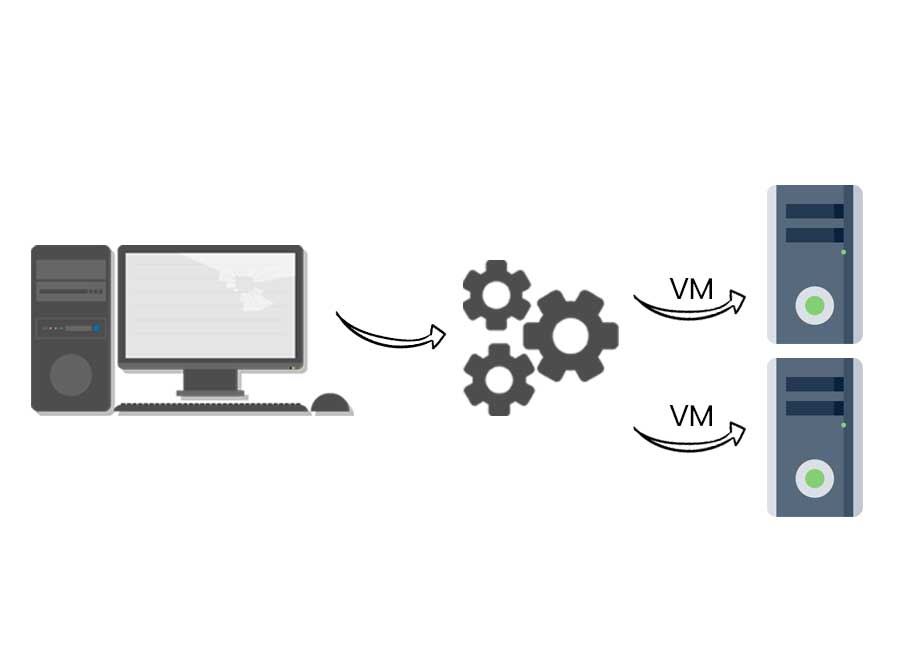5 Signs Your Business Needs a CRM Solution and How to Choose the Right One

Google PageSpeed Insights: Does It Matter Anymore?
June 28, 2024
How EMR Solutions Improve Patient Safety and Preventative Care
August 7, 2024Running a business can be hectic, right? Business has become the most potent tool for achieving financial stability. Investing in a business, whether massive or small, carries a huge risk. Customers are the most crucial unit in the business.
CRM, or Customer Relationship Management, is a software used to manage a company’s interactions with current and potential customers. It helps business owners by organizing customer information in one place, keeping track of all communications, and nurturing relationships with their leads and clients to enhance customer service, streamline operations, and boost sales. CRM Software replaces conventional means of storing data such as text files, spreadsheets, databases, and apps that many businesses patch together to track client data.
In this competitive age, you must be at your best to achieve the top position. If you choose CRM intelligently, it can help your business reach new heights. But how do you know if your business really needs one? Before wasting further time, let’s look at circumstances when your company needs a CRM and how to find the proper one.Â
5 Signs Your Business Needs a CRM Solution
If you have not taken advantage of the CRM opportunity and are suffering from the challenges listed below, now is the time to ace this chance. Following are prominent signs that your business requires CRM right now.Â
Unorganized Customer Data
If you are still using old methods for storing consumer data, you are on the wrong track. Many small organizations overlook client data, believing that it is of no benefit, and even when they do save it, they do so in disorganized ways, using spreadsheets or even sticky notes. These heinous activities make their firm appear cheap and low-quality. When they do not have a record of their consumers, they know nothing about their customers and cannot provide them with the services they require.
To address these difficulties, you might consider using CRM, which preserves your customer’s information with great precision and accuracy.Â
Ineffective Customer Service
Customer satisfaction is the key to a successful business. What is the point of your business if your customers are unhappy with you? If your team is having difficulty resolving customer issues, you should consider using a compatible CRM. Using CRM, you would have useful knowledge about your client’s competitive data and can also provide personalized ideas to your customers to ease and help them in decision-making.
Inefficient Sales Process
Looking for a needle in a haystack when it’s in your beard!!!! If your salespeople spend more time on unnecessary and unworthy items and less time on sales, how will you be able to retain your business? CRM can handle all unworthy assignments on its own, allowing salespeople to focus solely on sales and facilitate customers in a better manner.
Unfamiliarity With Business Performance
If you are having problems managing your business’s activity, you must use CRM. CRM can simply track all business fluctuations, both monthly and weekly. This guarantees that all business profits and losses are recorded, which can aid in the detection of any robbery or fraud that may have occurred in the business. This might help you identify your weaknesses and enhance all aspects of your business.Â
Personalized Care For Special Customers
This is not uneven at all to treat your old customer with special treatment. First and foremost, all consumers are the same, but it is not always a terrible idea to treat your regular customers differently. CRM will assist you in remembering the crucial events of that specific customer. A CRM allows you to divide up your clients, manage communication, and simplify follow-ups, ensuring that no consumers are ignored.
Tips for Selecting the Perfect CRM Solution for Your Business
Choosing the right CRM can be a game-changer for your business, but with so many options out there, it’s easy to get overwhelmed. Here are some key tips to help you select the perfect CRM solution for your needs:
Define Your Business Goals
Before diving into features, take a step back and identify your business goals and areas for improvement. What are your biggest customer relationship pain points? Are you looking to streamline sales, improve marketing campaigns, or enhance customer service? Knowing your goals will guide you toward CRMs with functionalities that directly address them.
For example, if your sales team is struggling to close deals, you’ll need a CRM with strong pipeline management capabilities. This will allow you to track the progress of deals from initial contact to close, identify potential bottlenecks in the sales process, and forecast sales revenue more accurately. On the other hand, if you’re looking to improve marketing campaign performance, you’ll need a CRM with marketing automation tools. These tools can help you automate repetitive tasks such as email campaigns and social media scheduling, allowing you to create more targeted and effective marketing campaigns that nurture leads and convert them into paying customers.
Ultimately, by taking the time to identify your specific business needs and goals, you’ll be in a much better position to select a CRM solution that provides the features and functionalities you need to achieve success.
Consider Features and Functionalities
CRM solutions come with a wide range of features, but not all of them are essential for every business. Here’s a breakdown of some of the most common CRM features and how they can benefit your business:
Contact management
A central hub to store and organize all your customer and prospect information, including contact details, interaction history, communication preferences, and more. This can help you build stronger relationships with your customers by providing a 360-degree view of their interactions with your business.
Lead tracking
Tools to capture, qualify, and nurture leads throughout the sales funnel. This can help you convert more leads into paying customers by tracking their progress through the sales process and identifying opportunities to nurture them with targeted content and communication.
Pipeline management
Visualize your sales pipeline and track the progress of deals from initial contact to close. This can help you forecast sales revenue, identify potential bottlenecks in the sales process, and close more deals faster.
Marketing automation
Automate repetitive marketing tasks such as email campaigns, social media scheduling, and lead nurturing. This can help you save time and resources, and create more targeted and effective marketing campaigns.
Reporting and analytics
Generate reports and dashboards to track key metrics such as sales performance, customer acquisition cost, and customer lifetime value. This data can help you gain insights into your customer relationships and make data-driven decisions to improve your overall CRM strategy.
User Experience (UX)
Even the most powerful CRM is useless if your team hates using it. So, prioritize a user-friendly interface that’s intuitive and easy to navigate. A well-designed CRM should be clean and uncluttered, with clear menus and easy-to-find features. It should also be responsive and work seamlessly on all devices, from desktops and laptops to tablets and smartphones. This is important because your sales team, customer service reps, and other users will likely be accessing the CRM on the go, and they need to be able to quickly access and update information from anywhere.
In addition to a user-friendly interface, consider the CRM’s ease of use and learnability. Look for a CRM that offers a variety of training resources, such as video tutorials, user guides, and webinars. The vendor should also provide ongoing support to help your team get up and running quickly and answer any questions they may have along the way. A CRM with a user-friendly interface, ease of use, and robust training and support resources will ensure that your team is comfortable using the CRM and can maximize its benefits.
Scalability and Future Needs
Don’t just focus on your current needs; think about your business’s future state as well. Choose a CRM that can scale with you as you grow. Consider factors like how many users you expect to need the CRM for, how much data you anticipate storing, and whether you plan to add new features or integrations in the future. Will the CRM be able to accommodate these changes? Look for a CRM that offers a flexible architecture that can adapt to your evolving needs.
In addition to scalability, consider the CRM’s integration capabilities. Does it integrate with the other business tools you already use, such as your accounting software, marketing automation platform, or email marketing tool? Seamless integrations can help you streamline workflows, avoid data silos, and improve overall efficiency. Many CRMs offer pre-built integrations with popular business tools, and some offer open APIs that allow you to connect with custom applications.
Budget and Cost
CRM solutions come in a variety of price ranges, from free and open-source options to enterprise-level solutions with robust feature sets and high customization capabilities. Determine your budget upfront and shortlist CRMs that fit comfortably within your financial constraints. Many CRM vendors offer tiered pricing plans with different feature sets, so you can choose the plan that best aligns with your needs and budget. For example, a free or open-source CRM might be a good option for a small business with basic needs, while a larger business with complex sales processes and a large customer base might require a more sophisticated (and expensive) CRM solution. Consider the total cost of ownership (TCO) as well, which includes not just the software license fee but also the cost of implementation, training, and ongoing support.
Look For Good Customer Support
Even with the best CRM, you might encounter questions or issues during implementation, usage, or as your business needs evolve. Make sure the vendor offers reliable customer support in multiple channels, whether through phone, email, online chat, or a comprehensive knowledge base with helpful articles, tutorials, and FAQs. Ideally, the vendor should also offer different support tiers to cater to your specific needs. For example, a basic plan might offer email support, while a higher-tier plan might include priority phone support and dedicated account managers.
When To Look For A Custom CRM Solution
While off-the-shelf CRM solutions offer a convenient and cost-effective way to manage customer relationships which is great for startups. Since off-the-shelf CRM solutions usually have a large community to make the learning curve easy. What these off-the-shelf solutions often lack is 24/7 customer support which may make things frustrating especially when your business is growing. Additionally, off-the-shelf solutions often lack the level of customization, data security & compliance.
Custom CRM solutions, on the other hand, can be tailored to address your specific business processes, workflows, and data management requirements. Imagine having a CRM that flawlessly aligns with your unique sales funnels, captures industry-specific data points, and automates tasks specific to your business. This level of customization can significantly boost efficiency, productivity, and user adoption.
Here are some signs that a business should consider a Custom CRM Solution rather than a pre-built one:
Unique Business Processes
If your business has unique sales processes, workflows, or data requirements that aren’t well-supported by standard CRM features, a custom solution can be tailored to fit your specific needs. For instance, a business with a complex product configuration process might need a custom CRM that can handle intricate product variations and pricing structures.
Integration Challenges
If your business relies on a variety of custom software applications or has complex integration needs, a custom CRM can be built to seamlessly integrate with your existing systems. This can eliminate data silos and ensure that your CRM data is always up-to-date and accessible across your entire organization.
Data Security and Compliance
In some industries, businesses have strict data security and compliance regulations. A custom CRM can be designed to meet these specific requirements, giving you more control over your data security and ensuring regulatory compliance.
Scalability For Future Growth
If you anticipate significant growth in the future, a custom CRM can be built to scale with your business needs. This can be especially important for businesses in fast-growing industries or those that plan to expand into new markets.
The Desire For Complete Control and Customization
If you want complete control over the look, feel, and functionality of your CRM, a custom solution is the way to go. This allows you to tailor the CRM to your specific brand identity and user preferences.
Challenges That Comes With Custom CRM Solution
While A Custom CRM Solution offers great flexibility yet there are hurdles that you should consider and sort out before opting for a Custom CRM solution. Here are some of the factors that you should consider before choosing a Custom CRM solution:
Higher Upfront Cost
Custom CRM solutions can be significantly more expensive than off-the-shelf options. Before you decide to go custom, carefully weigh the cost of development, implementation, and maintenance against the potential benefits.
Development Time
Developing a custom CRM solution can be a time-consuming process. Be prepared to invest significant time and resources into the planning, development, and deployment of your custom CRM.
Maintenance
Developing and maintaining a custom CRM solution typically requires in-house technical expertise or the help of a qualified CRM development partner.
Conclusion
By following these tips and carefully considering your specific business requirements, you’ll be well on your way to selecting the perfect CRM solution that will not only boost your customer relationships but also drive significant business growth. A well-chosen CRM can improve sales team efficiency and effectiveness by streamlining lead nurturing, opportunity management, and deal tracking. It can also empower your marketing team to create more targeted campaigns and automate repetitive tasks. Furthermore, a CRM can provide your customer service team with a centralized view of all customer interactions, enabling them to resolve issues faster and deliver exceptional customer service. In short, the right CRM can be a powerful tool for improving customer satisfaction, loyalty, and advocacy, which can ultimately lead to increased revenue and profitability.
If you are leaning towards custom CRM know that a custom CRM, in essence, is an investment in building a system that perfectly reflects your business’s DNA. It offers unmatched flexibility, control, and the potential to significantly improve efficiency and customer satisfaction which off-the-shelf solutions can’t offer. However, the cost of development and ongoing maintenance can be higher compared to pre-built solutions. So, carefully weigh the pros and cons to determine if a custom CRM is the right fit for your company’s current and future needs.
Â






